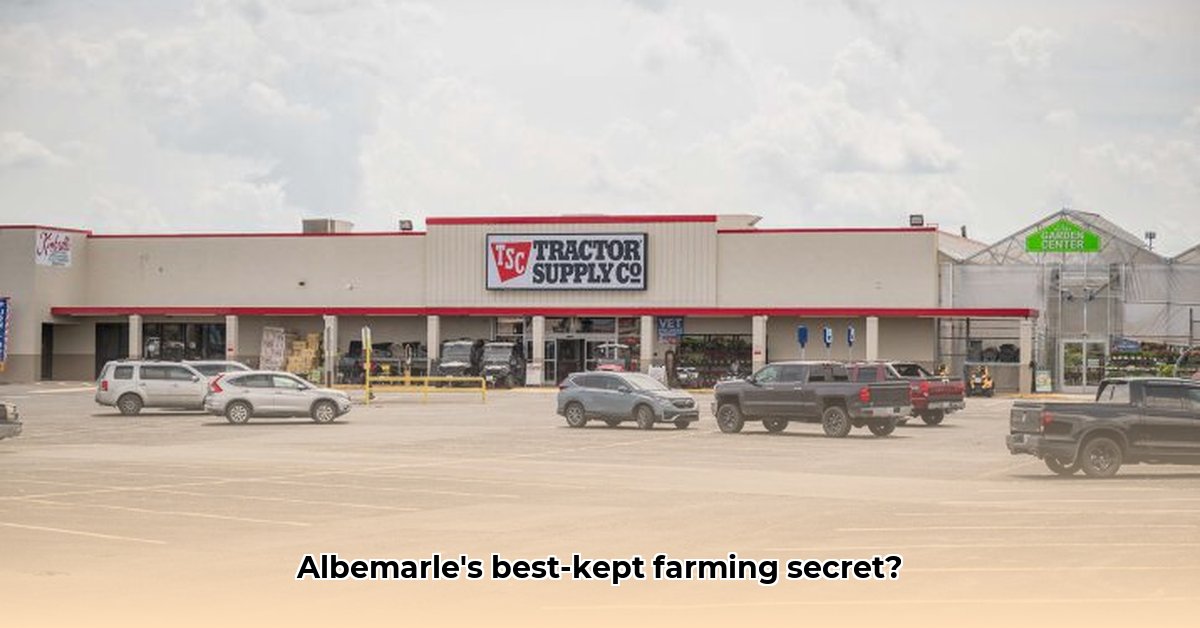
Assessing Albemarle Tractor Supply's Impact
Albemarle Tractor Supply, situated in the Stanly County Plaza, presents a compelling case study in rural retail and its impact on the agricultural community. Its strategic location offers easy access for farmers, but its long-term success hinges on several key factors beyond mere geographical convenience. This analysis examines the store's strengths, weaknesses, and potential for sustainable growth, considering its role within the larger context of local agriculture and environmental responsibility. For more information on sustainable farming practices, check out this helpful resource on goat fencing.
Location and Accessibility: A Strategic Advantage
The store's placement in the Stanly County Plaza provides undeniable benefits. Proximity to surrounding towns minimizes travel time and fuel costs for farmers—a significant advantage, especially considering the often-sprawling nature of agricultural operations. Its location near schools and parks suggests a potential commitment to community engagement, although further investigation is needed to confirm this. However, a prime location alone does not guarantee success. The store's inventory, pricing, and customer service must also align with the needs and expectations of the local farming community.
Inventory and Target Market: Unpacking the Product Mix
A critical yet currently under-researched aspect is the specific inventory carried by Albemarle Tractor Supply. Understanding the breadth and depth of its product offerings is crucial for assessing its ability to serve the diverse needs of the local farming community. Does it cater primarily to large-scale commercial operations, small-scale family farms, or both? The presence or absence of specialized equipment, organic farming supplies, and sustainable agricultural inputs reveals much about its strategic focus and its commitment to environmentally conscious practices. What percentage of its inventory comprises sustainable or eco-friendly options? This is a key indicator of its alignment with modern agricultural trends.
Sustainability: A Cornerstone of Agricultural Viability
Sustainability is a critical factor in the long-term viability of both agriculture and businesses serving the sector. Current information lacks details on Albemarle Tractor Supply's environmental practices. What concrete steps is the store taking to reduce its carbon footprint? What percentage of its waste is recycled? Does it offer training or educational resources on sustainable farming techniques? These questions, currently unanswered, are critical for evaluating its impact on the environment and its alignment with consumer demand for environmentally responsible products and services. The absence of robust data in this area significantly hinders a complete assessment.
Community Engagement: Beyond Geographical Proximity
While geographical proximity is advantageous, meaningful engagement with the local community is essential for long-term success. Albemarle Tractor Supply's potential for community involvement, suggested by its placement near schools and parks, requires further clarification. Does the store host workshops or educational events for farmers? Does it participate in or sponsor local agricultural initiatives? Does it actively solicit feedback from the community to better understand its needs? These interactions are crucial not only for building brand loyalty but also for fostering a supportive and collaborative environment within the agricultural sector.
Challenges and Opportunities: Navigating a Changing Landscape
Albemarle Tractor Supply faces several challenges. Maintaining a robust and reliable supply chain in an era of global economic volatility is crucial. Adapting to evolving agricultural practices and regulations, both at the local and national level, is essential for continued growth. However, opportunities also exist. Strategic investments in sustainable practices and active participation in community initiatives can position the store as a valuable partner to local farmers and enhance its long-term viability. Adapting to evolving consumer preferences—increasingly focused on sustainability and environmental responsibility—is non-negotiable for long-term market success.
Actionable Steps: A Roadmap for Sustainable Growth
Achieving sustainable growth requires a collaborative effort involving Albemarle Tractor Supply, local farmers, the community, and potentially government agencies or NGOs. A multi-pronged approach is necessary, focusing on both short-term and long-term actions:
- Enhancing Transparency and Measurement: Publicly disclose specific, measurable sustainability goals and regularly report on progress. This demands a shift from general statements to quantifiable metrics.
- Investing in Sustainable Sourcing: Prioritize suppliers committed to environmentally responsible practices and sustainable supply chains.
- Promoting Energy Efficiency: Encourage the use of energy-efficient equipment and agricultural practices through educational materials and direct engagement with farmers.
- Community Engagement and Education: Invest in local partnerships and offer workshops and programs that promote sustainable agriculture and environmental stewardship.
These steps are crucial for building a stronger, more sustainable future for both Albemarle Tractor Supply and the wider agricultural community it serves. The future success of the store will hinge on effectively responding to these challenges and opportunities.